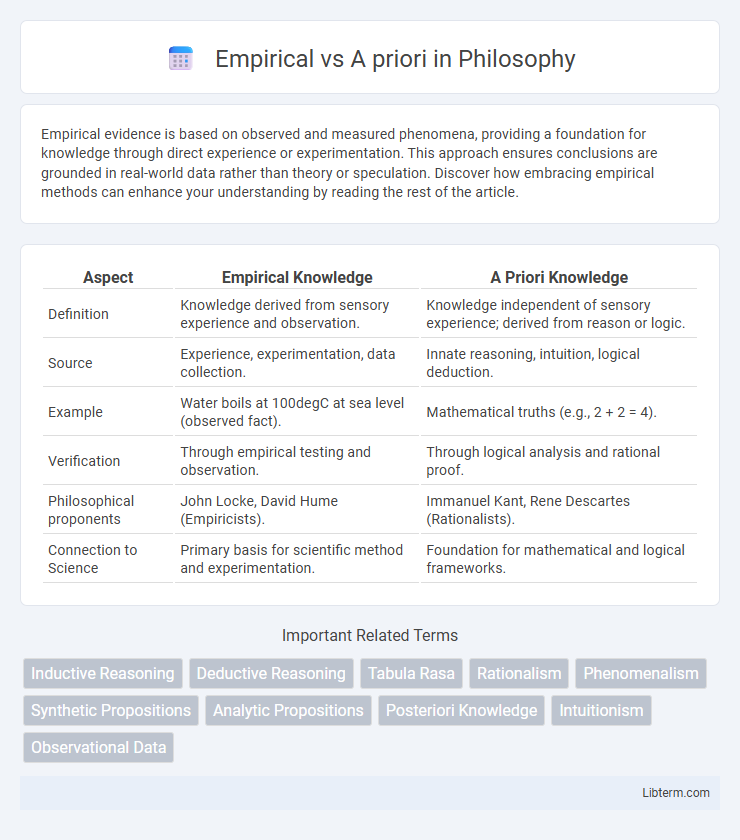Empirical evidence is based on observed and measured phenomena, providing a foundation for knowledge through direct experience or experimentation. This approach ensures conclusions are grounded in real-world data rather than theory or speculation. Discover how embracing empirical methods can enhance your understanding by reading the rest of the article.
Table of Comparison
| Aspect | Empirical Knowledge | A Priori Knowledge |
|---|---|---|
| Definition | Knowledge derived from sensory experience and observation. | Knowledge independent of sensory experience; derived from reason or logic. |
| Source | Experience, experimentation, data collection. | Innate reasoning, intuition, logical deduction. |
| Example | Water boils at 100degC at sea level (observed fact). | Mathematical truths (e.g., 2 + 2 = 4). |
| Verification | Through empirical testing and observation. | Through logical analysis and rational proof. |
| Philosophical proponents | John Locke, David Hume (Empiricists). | Immanuel Kant, Rene Descartes (Rationalists). |
| Connection to Science | Primary basis for scientific method and experimentation. | Foundation for mathematical and logical frameworks. |
Introduction to Empirical and A Priori Knowledge
Empirical knowledge derives from sensory experience and observation, forming the basis of scientific inquiry and experimental data. A priori knowledge exists independently of experience, relying on logical reasoning and innate concepts to establish truths. Understanding the distinction clarifies how humans comprehend and validate information through evidence or rational deduction.
Defining Empirical Knowledge
Empirical knowledge is defined as information acquired through sensory experience, observation, and experimentation, serving as the foundation for scientific inquiry and evidence-based conclusions. This type of knowledge relies on data collected from the real world, allowing for verification and falsification through empirical methods. Empirical knowledge contrasts with a priori knowledge, which is independent of experience and derived from logical reasoning or innate concepts.
Understanding A Priori Knowledge
A priori knowledge refers to information or understanding obtained independently of experience, relying solely on reasoning and innate concepts. Unlike empirical knowledge, which depends on sensory data and observation, a priori knowledge is often associated with mathematics and logic, where truths are known through deduction. This type of knowledge provides a foundation for certainty without requiring empirical verification, highlighting its significance in fields like philosophy and formal sciences.
Key Differences Between Empirical and A Priori
Empirical knowledge is derived from sensory experience and observation, relying on data collected through experimentation and evidence, whereas a priori knowledge is obtained through reasoning and logical deduction independent of sensory input. Empirical claims are contingent and subject to verification or falsification through empirical methods, while a priori claims are necessary and known through conceptual analysis or innate understanding. The fundamental difference lies in the source and validation of knowledge: empirical depends on external evidence, while a priori depends on innate logic and reason.
Historical Perspectives on Knowledge Types
Empirical knowledge, rooted in observation and experience, traces back to ancient philosophers like Aristotle, who emphasized sensory information as the basis for understanding the world. A priori knowledge, considered independent of experience, was notably advanced by Immanuel Kant, who argued that certain concepts and knowledge structures precede empirical data. These historical perspectives highlight the evolving debate on the origins and validation of knowledge, influencing contemporary epistemology and scientific methodology.
Roles in Scientific Inquiry and Philosophy
Empirical methods rely on observation, experimentation, and sensory experience to gather data and validate hypotheses, making them central to the scientific inquiry process. A priori knowledge, grounded in reasoning and logical deduction independent of sensory input, plays a crucial role in philosophy by establishing foundational principles and conceptual frameworks. Both approaches complement each other: empirical evidence tests and refines theories, while a priori reasoning offers essential insights and definitions that guide scientific exploration.
Strengths and Limitations of Each Approach
Empirical approaches offer strengths in verifiable data and observation-based evidence, allowing for practical validation and real-world applicability but can be limited by measurement errors and contextual variability. A priori methods provide strengths in logical deduction and theoretical clarity, enabling conclusions drawn independently of experience, yet they may lack empirical grounding and be challenged by assumptions that do not hold in practice. Balancing empirical evidence with a priori reasoning often enhances the robustness and comprehensiveness of knowledge acquisition.
Examples of Empirical Knowledge
Empirical knowledge is derived from observation and experimentation, such as the discovery of gravity through Newton's apple falling or the identification of bacteria under a microscope. Scientific experiments validating the effects of medications on patients provide concrete empirical data. Weather forecasting methods based on collected atmospheric data also exemplify empirical knowledge.
Examples of A Priori Knowledge
A priori knowledge includes examples such as mathematical truths like 2+2=4, logical deductions like "all bachelors are unmarried," and definitions including "a triangle has three sides," which can be known independently of experience. These examples illustrate truths that are necessarily valid and can be derived through reason alone. Unlike empirical knowledge, a priori knowledge does not rely on sensory data or observation for validation.
Implications for Modern Research and Thought
Empirical research relies on observation and experimentation, providing concrete data that drives evidence-based conclusions critical for scientific advancement. A priori knowledge, derived from logical reasoning without direct experience, shapes theoretical frameworks and foundational assumptions in disciplines such as mathematics and philosophy. The interplay between empirical data and a priori reasoning enhances modern research by balancing measurable evidence with abstract theorization, fostering comprehensive understanding and innovation across fields.
Empirical Infographic

 libterm.com
libterm.com